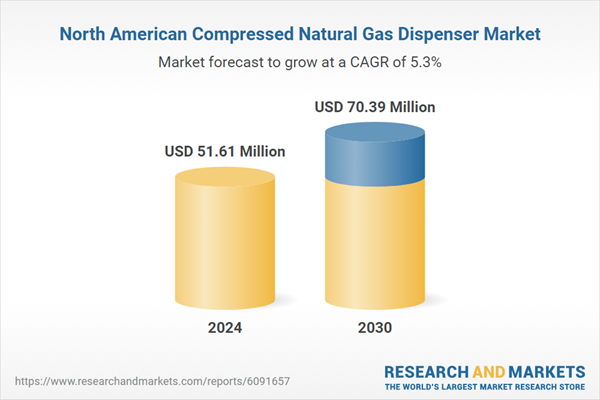Speak directly to the analyst to clarify any post sales queries you may have.
10% Free customizationThis report comes with 10% free customization, enabling you to add data that meets your specific business needs.
Technological improvements in dispenser safety, speed, and accuracy are further accelerating adoption. Favorable fuel pricing compared to diesel and gasoline, along with abundant natural gas reserves across North America, enhances long-term viability. The market is also benefiting from federal and state-level incentives, making CNG infrastructure expansion more economically feasible. These converging factors are expected to fuel steady growth in dispenser installations across the region.
Key Market Drivers
Government Policies Promoting Low-Emission Transportation Fuel Infrastructure
Government initiatives in the United States and Canada are significantly boosting the adoption of compressed natural gas dispensers. Both federal and state programs provide grants, tax incentives, and funding support for building clean energy infrastructure, particularly in transportation. Policies targeting greenhouse gas reductions are encouraging fleet operators, municipalities, and energy companies to invest in CNG fueling stations. States like California and New York have implemented clean transportation mandates that actively support the transition to alternative fuels. Public-private partnerships are increasingly co-developing CNG stations, particularly for municipal buses and logistics fleets. These collaborative efforts, combined with regulatory mandates and emission-reduction targets, are catalyzing the deployment of dispensers across high-traffic and urban zones, reinforcing CNG as a mainstream fuel alternative.Key Market Challenges
High Initial Capital Investment in Infrastructure Development
Despite policy support, the high upfront cost of CNG fueling infrastructure poses a major barrier to broader market adoption. Establishing a full-service CNG station involves substantial investment in specialized equipment, including dispensers, compressors, storage systems, and safety mechanisms. These costs are often prohibitive for smaller fuel retailers and independent operators. Additional expenses arise from regulatory compliance, permitting, and training requirements. The long payback period, particularly in regions with low CNG vehicle penetration, limits investor interest. Technical complexities in installation and ongoing maintenance - especially due to high-pressure systems - add to the operational burden. Without further cost-reduction innovations or more robust public-private funding models, infrastructure growth may remain concentrated in high-demand urban and fleet-dense areas.Key Market Trends
Expansion of Public-Private Partnerships to Accelerate Dispenser Network Growth
A key trend reshaping the North American CNG dispenser market is the rise of public-private partnerships aimed at accelerating infrastructure deployment. Collaborations between governments, utility providers, and private companies are facilitating the development of strategically located CNG fueling corridors and transit hubs. These partnerships share financial risk, streamline approvals, and provide long-term service contracts that ensure operational continuity. By focusing on logistics centers, industrial parks, and public transport depots, such ventures are addressing previous coverage gaps and fostering a more cohesive refueling network. As governments push for cleaner fleets and reduced transport emissions, these integrated investment models are playing a central role in scaling the CNG infrastructure efficiently across North America.Key Market Players
- Fueling Technologies, Inc.
- Dover Company
- IMW Industries, Inc.
- Gilbarco Veeder-Root
- Ingersoll Rand Inc.
- Haskel International, Inc.
- ProGas, Inc.
- Atlas Copco AB
Report Scope:
In this report, the North America Compressed Natural Gas Dispenser Market has been segmented into the following categories, in addition to the industry trends which have also been detailed below:North America Compressed Natural Gas Dispenser Market, By Type:
- Fast Fill
- Time Fill
North America Compressed Natural Gas Dispenser Market, By Distribution:
- Company Owned & Company Run
- Company Owned & Dealer Run
- Dealer Owned & Dealer Run
North America Compressed Natural Gas Dispenser Market, By Country:
- United States
- Canada
- Mexico
Competitive Landscape
Company Profiles: Detailed analysis of the major companies present in the North America Compressed Natural Gas Dispenser Market.Available Customizations:
With the given market data, the publisher offers customizations according to a company's specific needs. The following customization options are available for the report.Company Information
- Detailed analysis and profiling of additional market players (up to five).
This product will be delivered within 1-3 business days.
Table of Contents
Companies Mentioned
- Fueling Technologies, Inc.
- Dover Company
- IMW Industries, Inc.
- Gilbarco Veeder-Root
- Ingersoll Rand Inc.
- Haskel International, Inc.
- ProGas, Inc.
- Atlas Copco AB
Table Information
| Report Attribute | Details |
|---|---|
| No. of Pages | 120 |
| Published | May 2025 |
| Forecast Period | 2024 - 2030 |
| Estimated Market Value ( USD | $ 51.61 Million |
| Forecasted Market Value ( USD | $ 70.39 Million |
| Compound Annual Growth Rate | 5.3% |
| Regions Covered | North America |
| No. of Companies Mentioned | 8 |









